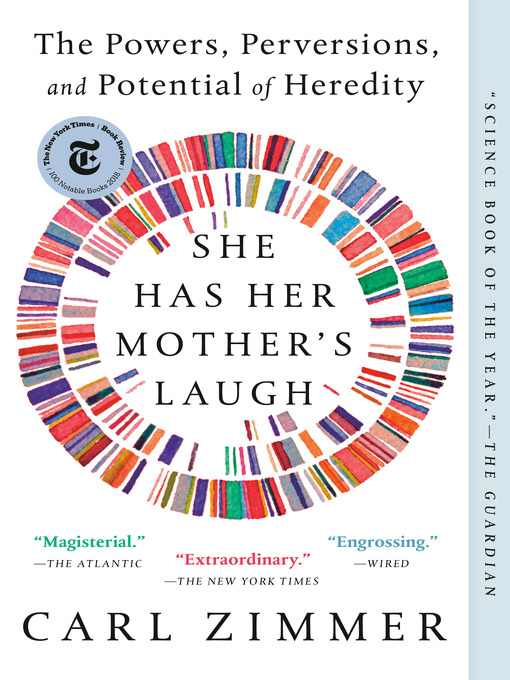
She Has Her Mother's Laugh
The Powers, Perversions, and Potential of Heredity
کتاب های مرتبط
- اطلاعات
- نقد و بررسی
- دیدگاه کاربران
نقد و بررسی

Starred review from February 19, 2018
In a magnificent work exploring virtually all aspects of heredity, journalist Zimmer (Parasite Rex), masterfully blends exciting storytelling with first-rate science reporting. Although he lucidly explains the basics of Mendelian genetics—which address inheritance and biological diversity—he goes far beyond that topic to explore the complexities of genetic inheritance. For example he notes that there are at least 800 genes influencing height in humans, but collectively they explain only about one-quarter of the heritability of that trait. Zimmer is not shy about taking on controversial topics like the genetics of race, arguing that there aren’t genetic fingerprints for race (“Ancient DNA doesn’t simply debunk the notion of white purity. It debunks the very name white”), and making the case that it is currently all but impossible to draw significant conclusions about the roles genes play in overall intelligence. He also probes developing field of epigenetics (changes in gene expression rather than alteration of genetic code) as well as the role of genetics in developmental and cancer biologies. Zimmer’s writing is rich, whether he’s describing the history of the field or examining the latest research and ethical issues certain to arise. His book is as engrossing as it is enlightening. Agent: Eric Simonoff, WME.

April 1, 2018
Zimmer (creative writing, Yale Univ.; Soul Made Flesh) has years of experience as a science journalist, and with this book strives to combine his varied research about heredity into one place. Heredity is really the only term to describe the material because Zimmer discusses much more than genes, including the "father of modern genetics" Gregor Mendel and the latest research on microbiomes, along with more controversial topics such as eugenics and genetic engineering. Particularly interesting is the discussion of epigenetics, a system reminiscent of Lamarkism that affects gene expression without altering the DNA itself. Jean-Baptiste Lamarck was a contemporary of Charles Darwin who believed individuals could pass down adaptations acquired during their lifetimes to their descendants. Zimmer makes the science personal by exploring his own family genealogy, DNA, and microbiome. The only drawback of this book, besides its length, is the vagueness of the chapter headings, which reveal little about what each section will hold. VERDICT Overall, Zimmer's latest offers a comprehensive look at all aspects of heredity in readable and accessible text for anyone interested in the topic.--Cate Schneiderman, Emerson Coll., Boston
Copyright 2018 Library Journal, LLC Used with permission.

April 1, 2018
A fascinating journey through the history of heredityBooks on the current revolution in genetics are not in short supply, so New York Times columnist Zimmer (Science Writing/Yale Univ.; A Planet of Viruses, 2011, etc.) casts his net more widely in a delightful history of efforts to discover why offspring resemble their parents but sometimes don't and how scientists are learning how to change matters. "Very often genes cannot give us what we really want from heredity," he writes. "Each of us carries an amalgam of fragments of DNA, stitched together from some of our many ancestors." As a journalist, the author believes that readers want to hear a story through the eyes of an individual, so he chooses one: himself. After having his genome sequenced, he showed the results to researchers so that they could interpret them. It turns out that he carries genes for two serious diseases; luckily, his wife does not. Zimmer shares many identical genes with a typical Nigerian and typical Chinese person. In case readers are in doubt, every expert agrees that genetics disproves the existence of traditional races. The inheritance of intelligence has made impressive progress despite no agreement on a definition. Though IQ tests don't measure it, per se, they do measure something worth having. People with a high IQ do better in life and live longer. Zimmer does not ignore famous historical oddities such as the Elephant Man, but he pays more attention to how humans inherit common diseases, height, skin color, aging, intelligence, and other traits. It's a search that begins with hokum--Jews were once considered disease-prone and unintelligent--and ends with captivating knowledge. A brief glossary will help readers with such terms as "endosymbiont" and "pluripotent."A thoroughly enchanting tour of big questions, oddball ideas, and dazzling accomplishments of researchers searching to explain, manipulate, and alter inheritance.
COPYRIGHT(2018) Kirkus Reviews, ALL RIGHTS RESERVED.

Starred review from April 15, 2018
When Gregor Mendel died, in 1884, his funeral drew thousands of grieving peasants?but not a single scientist. Zimmer here illuminates the Augustinian friar's once-unrecognized scientific breakthrough as a pivotal turning point in a human investigation of heredity, which has replaced Aristotle's speculative conjectures on the topic with the empirical knowledge compiled in the twenty-first-century chromosomal map of the human genome. That map and potent new microtechnologies for manipulating the biochemistry of the mapped genes have opened astonishing possibilities both for probing the distant past of human origins and for creating a brave new future of human development, free from genetic disease and weakness. But alongside this trajectory of stunning progress, readers trace a history of misconceptions about heredity. Some of those misconceptions?such as Darwin's mistaken pangenesis theory of all body cells influencing heredity?have arguably benefited science by stimulating debate and better research. Others, such as those motivating Nazi eugenicists, have augured only brutal racism. As revolutionary science now opens the prospect of designer superbabies?tantalizing some, horrifying others?Zimmer challenges the widespread misconception that DNA alone determines human identity, adducing compelling evidence that the way genes express themselves depends on environment, nutrition, and even culture. A wide-ranging and eye-opening inquiry into the way heredity shapes our species.(Reprinted with permission of Booklist, copyright 2018, American Library Association.)

























دیدگاه کاربران